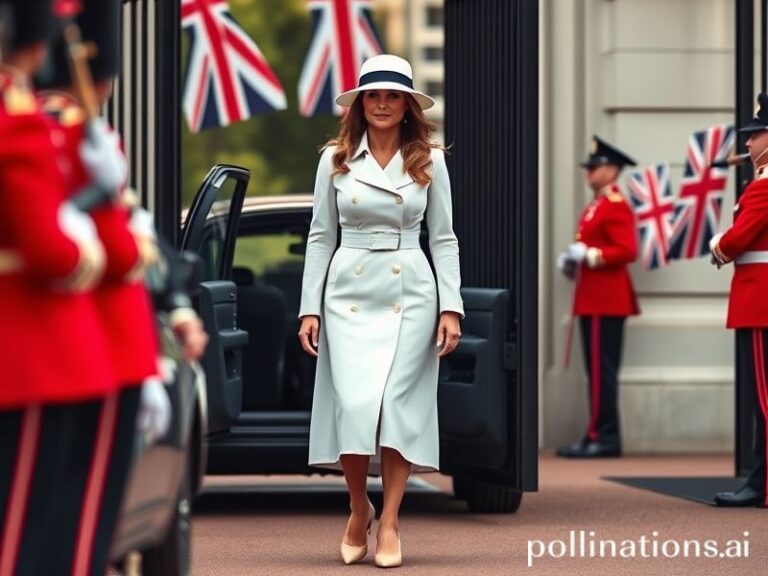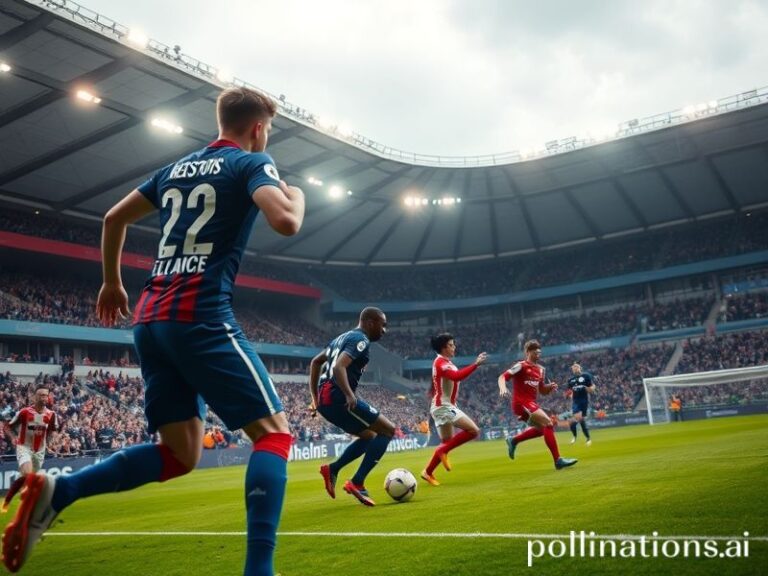The Global Friendly Farce: How Meaningless Soccer Matches Quietly Run the World
The Friendly Farce: How Meaningless Matches Keep the World Spinning (and the Cash Registers Ringing)
Somewhere between a glorified training session and an excuse for patriotic day-drinking, the international football “friendly” lumbers on—a ritual as old as FIFA’s first Swiss bank account. From the neon-drenched stadiums of Doha to the frostbitten stands of Reykjavik, these non-competitive kick-abouts have become the global game’s equivalent of a diplomatic cocktail party: everyone shows up, pretends to enjoy themselves, and leaves with slightly better airline miles.
The calendar insists these fixtures exist to “build cohesion” ahead of actual tournaments, as though twenty millionaires jogging at 70 % effort will somehow forge the esprit de corps needed to beat Germany in a penalty shootout. Yet the real choreography is happening off the pitch. Broadcasters from Lagos to Lima purchase rights at a discount, betting that even a tepid 0-0 between South Korea and Costa Rica outrates another rerun of *Friends*. Airlines issue “sport fares” that evaporate faster than a manager’s job security. And somewhere in a glass tower, a consultant presents a PowerPoint titled “Leveraging Friendly Synergies for Q3 Merch Velocity,” while the rest of us try to remember whether we’re supposed to sing the second verse of the anthem.
Globalization’s greatest trick was convincing nations that a Tuesday-night run-out in New Jersey is vital prep for a World Cup in the desert. The United States, eternal host with the stadia and the TSA throughput, welcomes Argentina one week and Ghana the next, each match preceded by a military flyover and followed by a traffic jam so biblical that Moses himself would consider UberPool. Across the Atlantic, European sides cram “warm-ups” into the October break like commuters stuffing overhead bins—then wonder why hamstrings snap faster than Brexit promises.
Emerging markets have learned to monetize the charade with gusto. Vietnam’s tour of the Gulf states isn’t about tactics; it’s a photo-op for sovereign wealth funds seeking soft-power polish. Qatar, still high on World Cup afterglow, treats friendlies as live-action Yelp reviews: bring in Brazil, let Neymar smile for thirty minutes, and watch the tourism metrics tick up a decimal point. Meanwhile, Chinese Super League clubs—when not being confiscated by the state—dispatch entire delegations to Spain for “tactical immersion,” proving that nothing says strategic depth like watching Real Madrid’s third-choice keeper in a half-empty Mestalla.
The geopolitical subplot is deliciously absurd. When Ukraine lined up against Germany last spring, the handshake lasted longer than the match, cameras zooming in on every micro-expression like Kremlinologists at a May Day parade. Israel and Argentina’s 2018 Jerusalem fixture was canceled after BDS protests, reminding us that even a meaningless game can trigger real-world embargoes. And pity the poor CONCACAF official who scheduled a U.S.–Iran friendly “to foster dialogue,” only to discover both federations had quietly booked separate hotels on different continents.
Players, those million-dollar pawns, have adapted with entrepreneurial flair. A star striker will post “Honoured to wear the armband! #Blessed” while his agent negotiates image rights for the pre-match handshake. Medical teams, ever innovative, now issue “precautionary withdrawals” that suspiciously coincide with Champions League quarterfinals. The fans, bless their polyester hearts, still belt out songs about wars their grandparents barely survived, proving that tribal loyalty is the one commodity not subject to supply-chain disruptions.
And yet, cynicism only goes so far. Somewhere in Sierra Leone, a kid streams Ivory Coast vs. Zambia on a cracked phone and decides to keep playing. In refugee camps outside Amman, displaced Syrians huddle around a flickering screen to watch their patched-together national team draw 1-1 with Oman, and for ninety minutes the world’s indifference feels slightly less absolute. Even the most synthetic spectacle can produce an unscripted moment—a rabona assist, a debutant’s tears, a goalkeeper’s howler immortalized in meme form—that reminds us why we bother with any of this in the first place.
So the friendlies roll on, equal parts cash grab and campfire. They won’t stop the next invasion, balance the next budget, or cure the next pandemic. But as long as flags wave, tills ring, and someone, somewhere, still believes the next goal might just be beautiful, the circus will remain on tour—non-competitive, non-essential, and irresistibly human.







